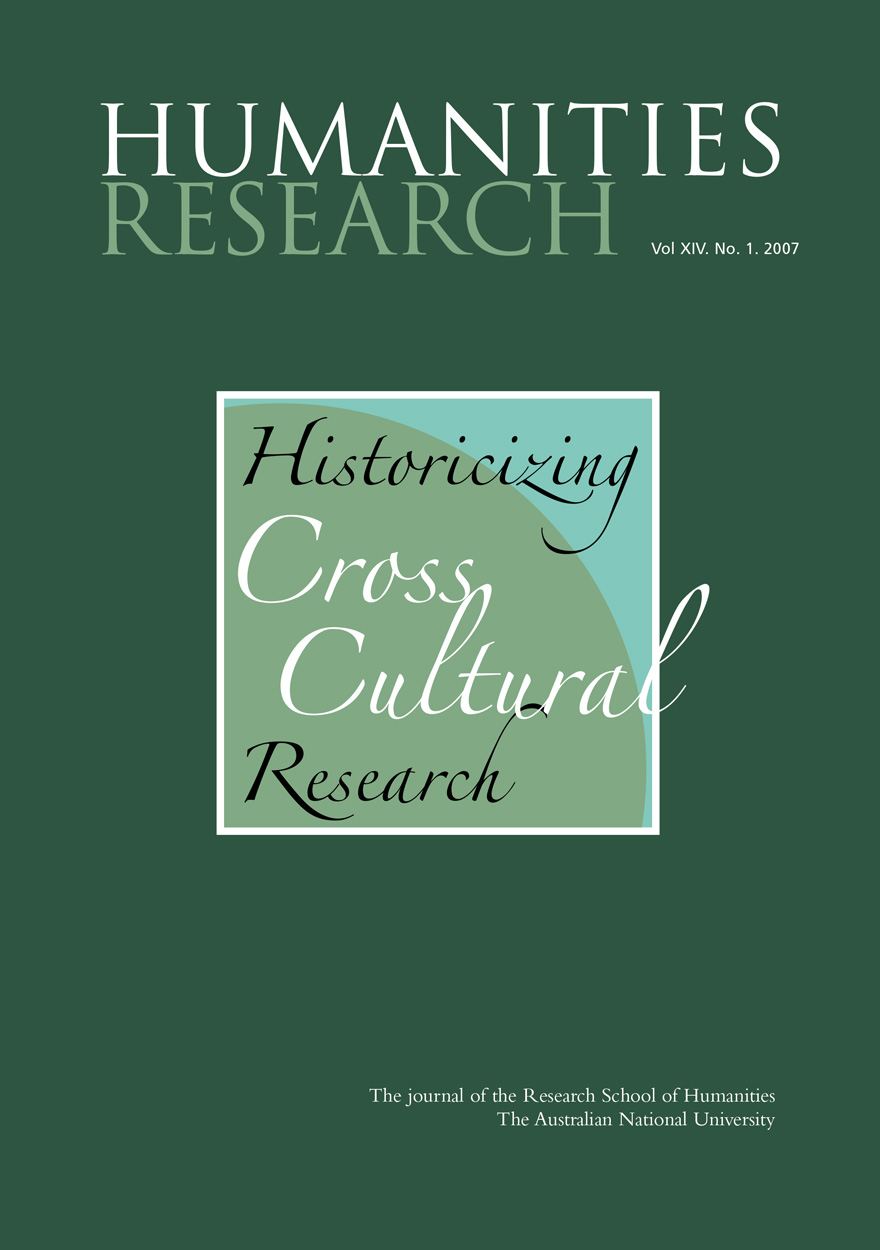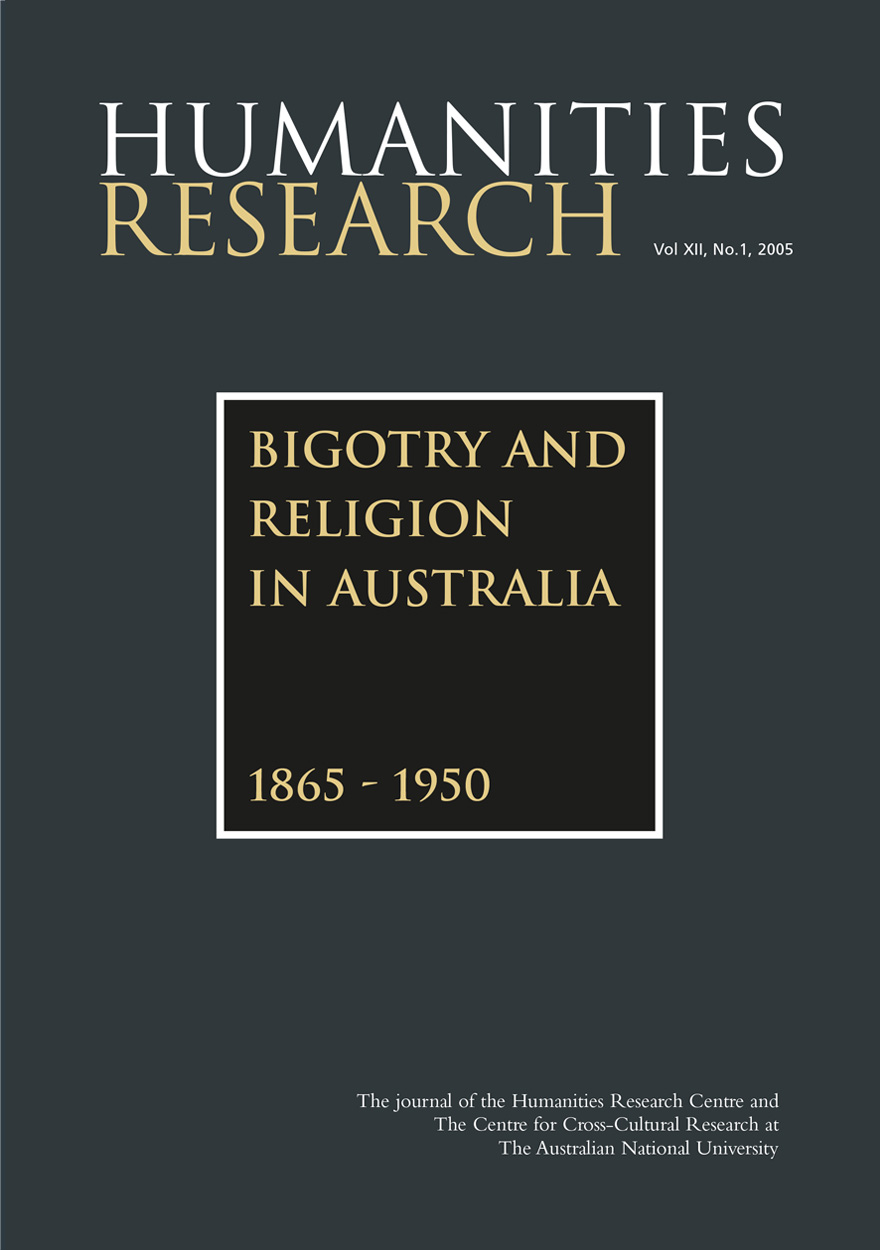Search titles
Displaying results 91 to 97 of 97.

Humanities Research: Volume XIV. No. 2. 2007 »
Pain and Death: Politics, Aesthetics, Legalities
Edited by: Carolyn Strange
Publication date: August 2007
Humanities Research is an internationally peer-reviewed journal published by the Research School of Humanities at The Australian National University. The Research School of Humanities came into existence in January 2007 and consists of the Humanities Research Centre, Centre for Cross-Cultural Research, National Europe Centre and Australian National Dictionary Centre. Launched in 1997, issues are thematic with guest editors and address important and timely topics across all branches of the humanities.
While politics and law may set the boundaries of sanctioned violence within and between states, their understanding and meanings are invariably conditioned by aesthetic questions. Inspired in part by the early phase of the so-called war on terror, when pictures of the penal excesses it unleashed initially created embarrassment and shame, the conference incorporated the work of scholars, artists and performers. This volume’s contributors move beyond the specifics of the war on terror to consider other instances in which officially legitimated violence has been invoked, contested or suppressed, not only through legal and political means, and in official records, but also in popular media and art forms.
Download for free
Not available for purchase

Humanities Research: Volume XIV. No. 1. 2007 »
Historicizing Cross-Cultural Research
Edited by: Benjamin Penny
Publication date: July 2007
Humanities Research is an internationally peer-reviewed journal published by the Research School of Humanities at The Australian National University. The Research School of Humanities came into existence in January 2007 and consists of the Humanities Research Centre, Centre for Cross-Cultural Research, National Europe Centre and Australian National Dictionary Centre. Launched in 1997, issues are thematic with guest editors and address important and timely topics across all branches of the humanities.
This issue of Humanities Research presents a selection of papers that seek to historicize cross-cultural research – involving studies of particular encounters between people of different cultures and investigation of the disciplinary categories in which those studies took place – and, in so doing, interrogate the term ‘cross-cultural’ and the variety of meanings it has accrued.
Download for free
Not available for purchase

Humanities Research: Volume XIII. No. 1. 2006 »
Britishness & Otherness
Edited by: Christina Parolin, Robyn Westcott
Publication date: November 2006
Humanities Research is an internationally peer-reviewed journal published by the Research School of Humanities at The Australian National University. The Research School of Humanities came into existence in January 2007 and consists of the Humanities Research Centre, Centre for Cross-Cultural Research, National Europe Centre and Australian National Dictionary Centre. Launched in 1997, issues are thematic with guest editors and address important and timely topics across all branches of the humanities.
This issue of Humanities Research presents a selection of papers offered to the ‘Britishness & Otherness: Locating Marginal White Identities in the Empire’ symposium, convened at the Humanities Research Centre at The Australian National University in July 2004. The symposium was designed to provoke a more sustained and nuanced contemplation of the mechanisms by which a plethora of British identities circulated within the Empire. Moreover, participants were encouraged to question the assumption that ‘Britishness’ was a static cultural identity accessed easily and equally by all phenotypically similar (i.e. white skinned) subjects of the British Empire.
Award winner
The Coalition for Western Women’s History, has awarded Sarah Carter’s article “Britishness, ‘Foreignness’, Women and Land in Western Canada 1890s-1920s” in Humanities Research Vol XIII. No. 1. 2006, the 17th Annual Joan Jensen – Darlis Miller Prize for the best article published in 2006 in the field of History of Women and Gender in the Trans-Mississippi West.
Download for free
Not available for purchase

Informative Psychometric Filters »
Authored by: Robert A. M. Gregson
Publication date: August 2006
This book is a series of case studies with a common theme. Some refer closely to previous work by the author, but contrast with how they have been treated before, and some are new. Comparisons are drawn using various sorts of psychological and psychophysiological data that characteristically are particularly nonlinear, non-stationary, far from equilibrium and even chaotic, exhibiting abrupt transitions that are both reversible and irreversible, and failing to meet metric properties. A core idea is that both the human organism and the data analysis procedures used are filters, that may variously preserve, transform, distort or even destroy information of significance.

Humanities Research: Volume XII. No. 1. 2005 »
Bigotry and Religion in Australia 1865- 1950
Edited by: Benjamin Penny
Publication date: May 2006
Humanities Research is an internationally peer-reviewed journal published by the Research School of Humanities at The Australian National University. The Research School of Humanities came into existence in January 2007 and consists of the Humanities Research Centre, Centre for Cross-Cultural Research, National Europe Centre and Australian National Dictionary Centre. Launched in 1997, issues are thematic with guest editors and address important and timely topics across all branches of the humanities.
This collection of essays examines manifestations of bigotry on the basis of religion in the period from the latter part of the nineteenth century until the aftermath of the second world war. It includes articles concerning both prejudice directed against one religious group as in the case of anti-semitism, as well as inter-religious bigotry, particularly conflict between Protestant and Catholic Christians. Some papers address specific incidents that took place under very particular local conditions while others analyse patterns of discrimination over the broad sweep of time; some examine prejudice in face-to-face situations and others in academic discourse. In other words, we have attempted to include as many different manifestations of the many tentacled beast that is religious bigotry as we have been able. In this way we hope to bring into clearer focus the situation in present-day Australian society, to trace important social changes, to provide historical contexts for current manifestations of religious prejudice, and to examine specific incidents or practices, or patterns of discrimination and prejudice, in our past.
This issue of Humanities Research is sponsored by the Herbert and Valmae Freilich Foundation, a part of the Humanities Research Centre of ANU devoted to research into all forms of prejudice and discrimination.
Download for free
Not available for purchase

El Lago Español »
Authored by: O.H.K. Spate
Publication date: April 2006
En sentido estricto, “el Pacífico” no existió como tal hasta que en 1520-21 Fernao de Magalhãis, más conocido como Magallanes, atravesó la enorme extensión de aguas que entonces recibieron su nombre». Con estas palabras, el historiador y geógrafo de origen británico Oskar Spate presenta su versión del proceso en el que ese inmenso vacío se transforma en centro de las relaciones globales. El lago español describe el éxito esencialmente europeo y americano en convertir ese espacio en el nexo del poder económico y militar.
Este trabajo es una historia del Pacífico, el océano que se convirtió en el escenario del poder y el conflicto conformado por la política de Europa y el contexto económico de la América española. Sólo podía haber un concepto de «el Pacífico» una vez establecido el límite y el contorno del océano y esto era, indudablemente, trabajo de europeos. Cincuenta años después de la Conquista, Nueva España y Perú fueron la base desde donde el océano conformó virtualmente un lago español.

The Spanish Lake »
Authored by: O.H.K. Spate
Publication date: November 2004
‘Strictly speaking, there was no such thing as “the Pacific” until in 1520-1 Fernao de Magalhãis, better known as Magellan, traversed the huge expanse of waters, which then received its name.’
With these opening words, Oskar Spate launches his account of the process by which the greatest blank on the map became a focus of global relations. The Spanish Lake describes the essentially European and American achievement of turning this emptiness into a nexus of economic and military power.
This work is a history of the Pacific, the ocean that became a theatre of power and conflict shaped by the politics of Europe and the economic background of Spanish America. There could only be a concept of ‘the Pacific’ once the limits and lineaments of the ocean were set and this was undeniably the work of Europeans. Fifty years after the Conquista, Nueva España and Peru were the bases from which the ocean was turned into virtually a Spanish lake.
Oskar Spate was born and educated in England where he completed a doctorate at the University of Cambridge in 1937 on the development of London. After the Second World War he combined lecturing in England with writing a regional geography of the Indian sub-continent.
In 1951 he took up the post of Foundation Professor of Geography in the Research School of Pacific Studies at The Australian National University, a position he held until 1967. From 1967 to 1972 he was Director of the Research School of Pacific Studies, ANU, and in 1972 moved to its Department of Pacific History.
Throughout his career, Oskar Spate published a wide diversity of papers and essays on such subjects as the geography of Europe, South Asia and Australia and the exploration of Australia and the Pacific. Upon his retirement in 1976, he devoted most of his energies to researching and writing his three-volume history The Pacific since Magellan.



